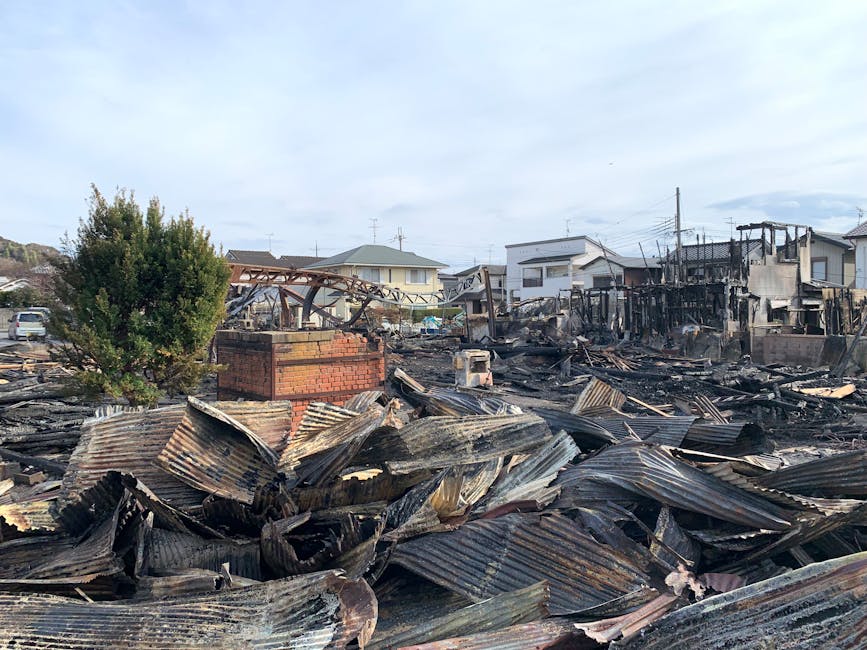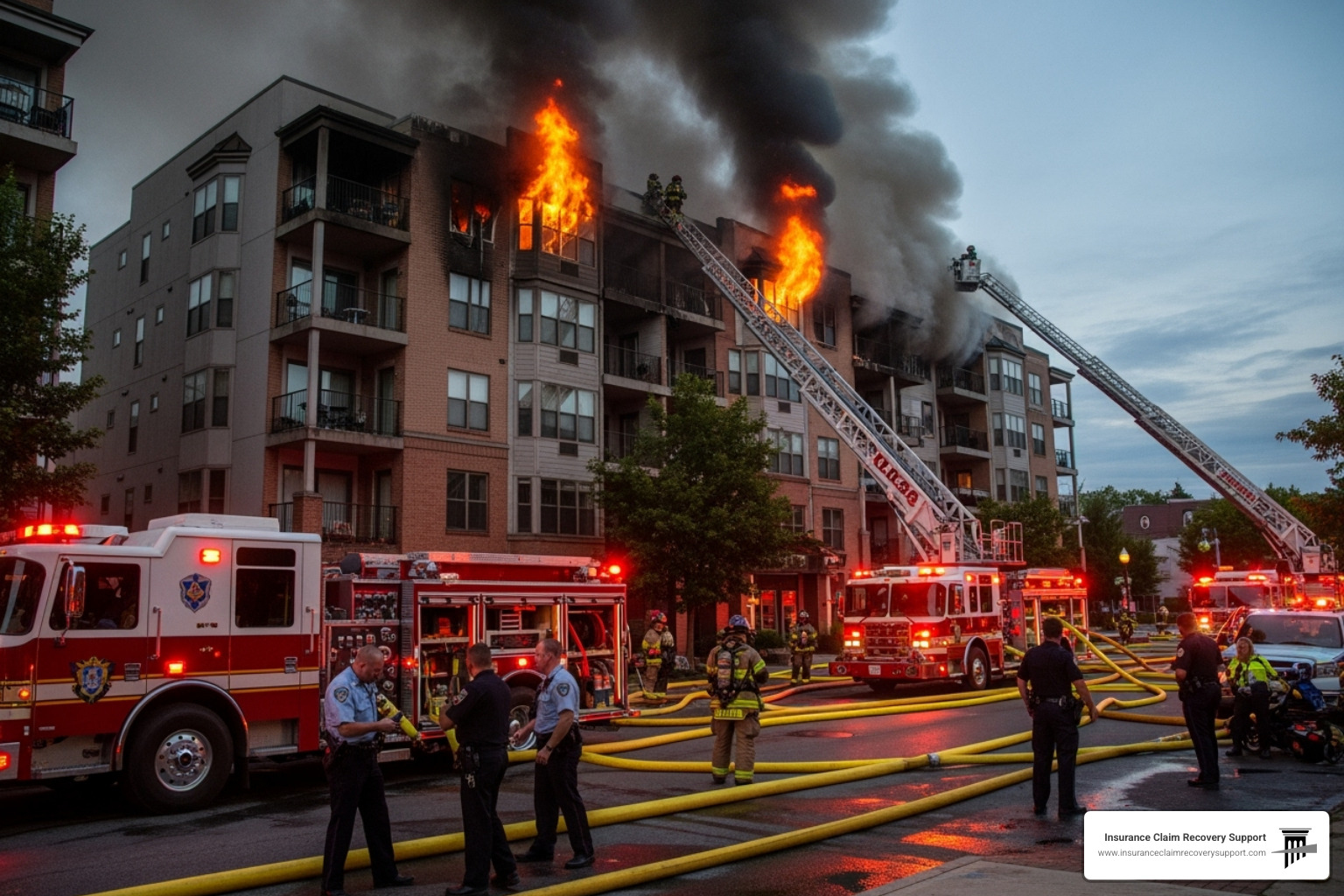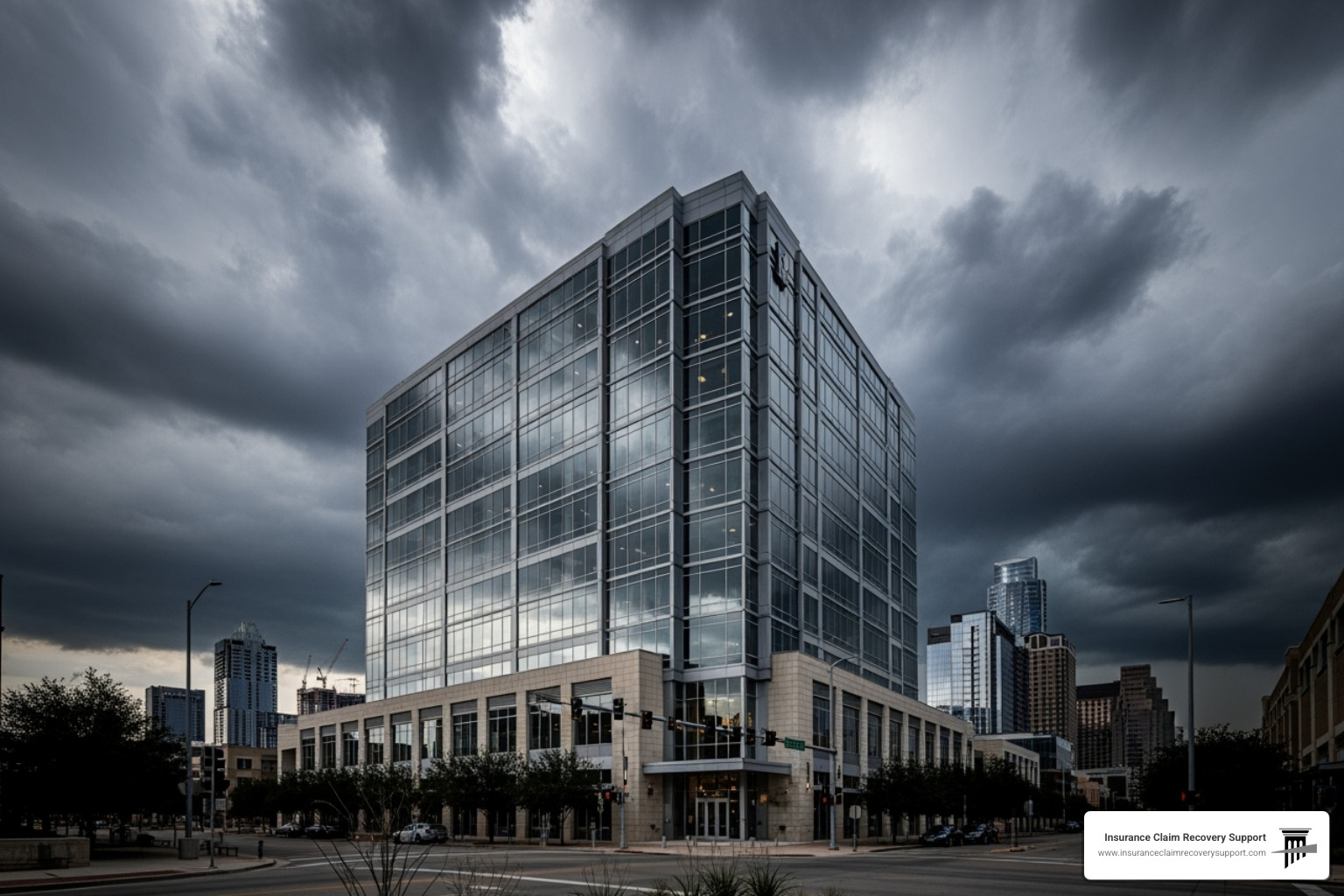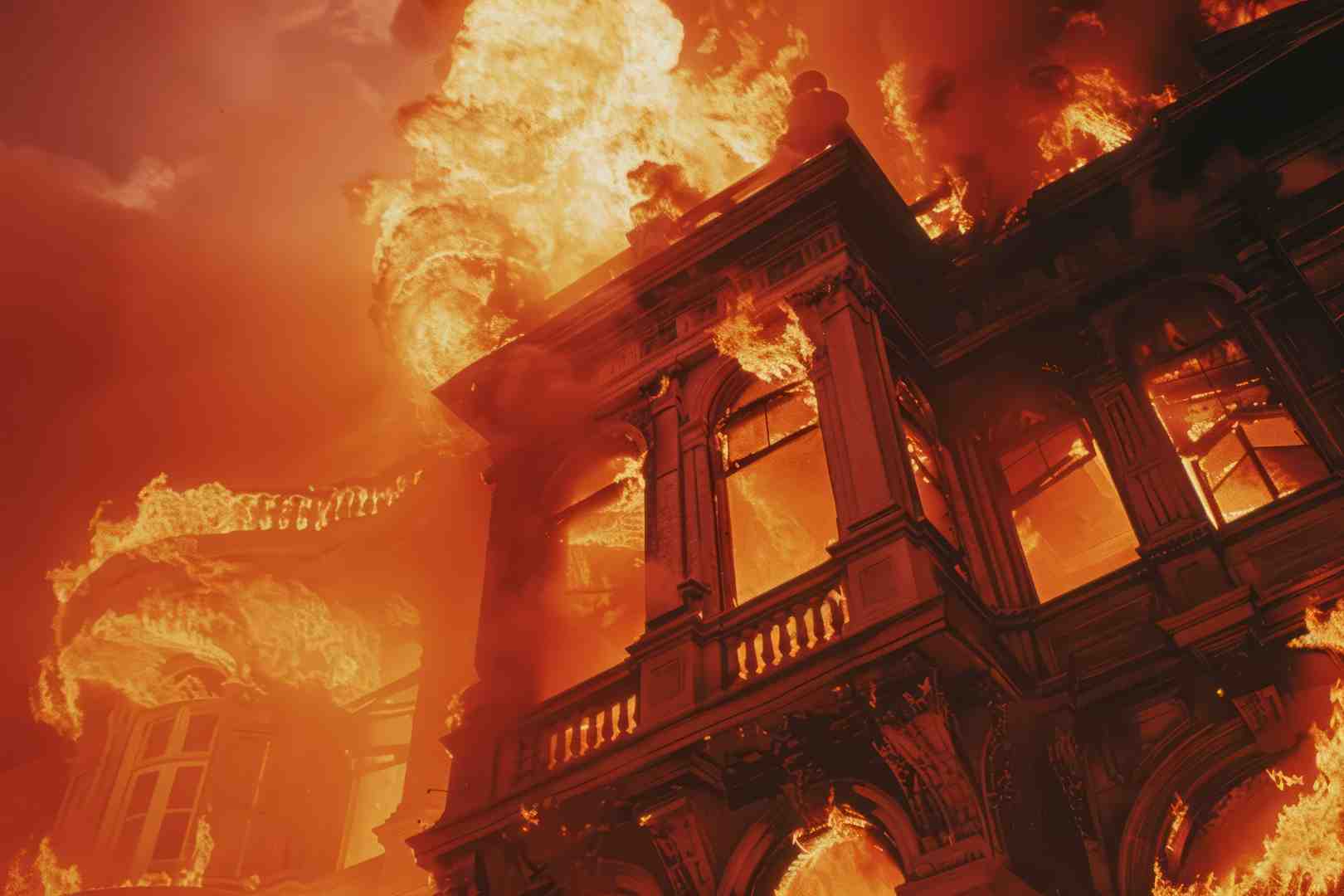Your First Steps After a Commercial Property Fire
Fire damage claims fl are overwhelming after a devastating fire. However, Florida property owners have clear rights, and knowing the right steps from day one makes all the difference.
Here’s what you need to do immediately after a commercial fire in Florida:
- Ensure safety – Don’t enter the building until cleared by authorities.
- Secure the property – Board windows and tarp roof damage to prevent further loss.
- Contact your insurance company within 24-48 hours to start your claim.
- Get the fire department report – This official document is crucial for your claim.
- Document everything – Take photos, videos, and create detailed inventory lists.
- Know your timeline – Florida gives you up to 4 years to file, but your policy likely requires immediate notice.
The stakes are high. The average fire damage claim in Florida costs around $80,000, with commercial properties facing much higher losses due to business interruption and complex restoration.
Many owners make costly mistakes in the first hours, from poor documentation to accepting low settlements. While Florida’s statute of limitations gives you four years for property damage claims, insurers have just 90 days to accept or deny your claim and must pay within 20 days if approved.
I’m Scott Friedson, a public adjuster who has settled over 500 large loss claims valued at more than $250 million, including many fire damage claims fl for commercial and multifamily properties. I help owners avoid litigation while maximizing settlements, sometimes increasing payouts by 30% to 3,800% over initial offers.

Understanding Your Commercial Fire Damage Claim
Understanding the cause of a fire is crucial for your fire damage claims fl process, as it impacts liability, coverage, and your settlement.
Electrical faults are a top cause. Overloaded circuits, outdated wiring, and faulty equipment are common culprits, especially in Florida’s humid climate which stresses electrical systems.
Cooking equipment is a major risk in properties with commercial kitchens. These fires can spread rapidly through ventilation systems.
Lightning strikes are particularly common in Florida during storm season, posing a significant risk to commercial properties.
Arson creates complex claims. Intentional fires trigger extensive investigations, and the distinction between third-party arson (possibly covered) and policyholder arson (never covered) is critical.
Human error, such as careless smoking or improper storage of flammable materials, is another common cause.
Liability determination under Florida law hinges on negligence and compliance with the Florida Fire Prevention Code. Owners are typically liable for fires caused by poor maintenance or code violations.
Lease agreements can shift fire safety duties to tenants. If tenant negligence causes a fire, the lease dictates financial responsibility.
Contractor negligence from faulty work can also lead to fires, giving you grounds to pursue the contractor separately from your insurance claim.
A thorough policy review before a disaster is key to understanding your coverage and avoiding surprises.
What Your Commercial Policy Typically Covers

Commercial fire insurance provides multiple layers of protection. Understanding each type helps maximize your settlement.
Dwelling coverage covers the building structure itself, including walls, roofs, and floors. It’s the foundation of most commercial policies.
Personal property coverage protects business assets inside, such as equipment, inventory, and furniture. This is often as critical as building protection.
Business interruption covers lost income and ongoing expenses like payroll and rent if the fire forces a temporary closure.
Loss of use helps with temporary relocation costs, which can be vital for business survival.
Debris removal covers the high cost of cleaning up charred materials and contaminated debris after a fire.
Additional structures coverage protects detached buildings on your property, like garages or storage units.
However, policy exclusions create coverage gaps. Intentional acts, war, and nuclear risks are typically excluded. Understanding these helps you prepare for out-of-pocket costs.
Replacement Cost (RCV) vs. Actual Cash Value (ACV)
The difference between Replacement Cost Value (RCV) and Actual Cash Value (ACV) can mean hundreds of thousands of dollars in your settlement and determines if your business fully recovers.
Actual Cash Value pays for replacements minus depreciation. An old oven is replaced based on its used value, not the cost of a new one.
Replacement Cost Value pays the full cost to buy new replacements without deducting for depreciation.
| Feature | Replacement Cost Value (RCV) | Actual Cash Value (ACV) |
|---|---|---|
| Definition | Cost to replace with new, similar item, no depreciation | Cost to replace with new, similar item, minus depreciation |
| Payout | Generally higher, allows full replacement | Generally lower, accounts for age/wear |
| Business Impact | Enables faster, more complete restoration | May leave a gap between payout and replacement cost |
| Example (Equipment) | A 7-year-old commercial oven costs $15,000 new. RCV pays $15,000. | Same oven, 7 years old, depreciated value $5,000. ACV pays $5,000. |
For commercial properties, RCV coverage is crucial for survival. It lets you replace damaged assets with new ones, enabling a faster return to operations without huge out-of-pocket costs.
Insurers often pay ACV first, releasing the remaining amount after you provide replacement receipts. Understanding this helps you manage cash flow during recovery.
The Step-by-Step Process for Florida Fire Damage Claims
Navigating fire damage claims fl after a fire is challenging. A structured approach improves your chances of a fair settlement.
Your first priority is your duty to mitigate damages—taking reasonable steps to prevent further loss. Your policy covers these costs, so act quickly.
- Tarping roofs is critical to prevent water damage from Florida’s storms if the roof is compromised.
- Boarding windows and doors protects your property from weather, vandalism, and theft.
- Water extraction and drying is vital. Firefighting leaves behind thousands of gallons of water, which can cause secondary damage if not removed professionally within 24-48 hours.
- Preventing mold is crucial in Florida’s climate, as it can grow within 24-48 hours of water exposure. Mold resulting from covered water damage may be covered even with a mold exclusion.
Notify your insurer immediately as required by your policy. Delays can complicate your claim. Get a claim number and document every conversation, including date, time, and names.
Essential Documentation for Your Fire Damage Claims FL

Thorough documentation is critical for successful fire damage claims fl. Organized evidence strengthens your negotiating position.
- Photographic and video evidence is your first priority once it’s safe to enter. Capture everything before cleanup, from wide shots to detailed close-ups of all damage, including smoke and soot.
- Your detailed inventory of damaged property must be meticulous. For each item, list its name, quantity, make/model, purchase date, original cost, and replacement cost. “Before” photos are invaluable.
- The fire department report provides official documentation of the fire’s cause and origin. Obtain a copy as soon as possible.
- Multiple repair estimates from reputable contractors provide leverage. Insurers often use the lowest bid to minimize payouts, so get multiple detailed estimates.
- Keep receipts for all related expenses, including mitigation, temporary relocation, and lost wages.
- Document all communications with your insurer in a log. Request written confirmation of important agreements.
- The Proof of Loss form is a critical document. If you’re uncertain of the full damage amount, write “undetermined” to avoid limiting your claim before a full assessment.
Working with the Insurance Company’s Adjuster
The insurance company’s adjuster works for them, not you. Their job is to assess damage and determine the insurer’s liability, often with pressure to minimize payouts.
Be present during the on-site inspection to point out all damage, especially hidden issues like smoke behind walls or water in structural materials.
If the adjuster requests a recorded statement, proceed carefully. You are not required to give one without representation. If you do, stick to known facts and avoid speculation.
Insurer negotiation tactics can include undervaluing damages or disputing coverage. Their first offer is rarely their best, and you are not obligated to accept it.
Your rights as a policyholder in Florida include a fair and timely claim assessment within 90 days. If approved, payment must be made within 20 days.
Hiring a public adjuster levels the playing field. They work for you, not the insurer, and can identify damages and coverage the company’s adjuster might miss.
For detailed information about your rights and the insurance claims process in Florida, consult the Florida Division of Consumer Services: More info about the Florida insurance claim process.
Navigating Disputes: Public Adjuster vs. Lawsuit
Unfortunately, insurers don’t always handle claims fairly. Many property owners face underpayment, delays, or wrongful denials of their fire damage claims fl.
Insurers are businesses focused on their bottom line. When they minimize your claim, you have two main options: hire a public adjuster or file a lawsuit.
Your timeline is crucial. Florida’s statute of limitations gives you four years to file a property damage lawsuit. However, your policy requires much faster notification. Waiting too long makes gathering evidence difficult.
Common Roadblocks in Fire Damage Claims FL and How to Steer Them
Even with perfect documentation, claims can hit snags. Insurers use various tactics to reduce payouts, so it helps to know what to expect.
- Disputes over the scope of damage are common. Insurers often downplay the extent of damage, especially hidden smoke, soot, and water damage that can spread far beyond the flames via HVAC systems.
- Disagreements about repair costs are another hurdle. Your contractor’s estimate may be much higher than what the insurer is willing to pay. They might argue for cleaning items that should be replaced for safety.
- Lowball settlement offers are frequent. Insurers often make initial offers far below your claim’s actual worth, hoping you’ll accept quickly.
- Hidden damage from smoke, soot, and water is a major challenge. It can seep into walls and air systems, causing future issues like mold and equipment failure if not properly assessed.
- Insurers may use allegations of arson or fraud or unreasonable delays to avoid payment, hoping you’ll give up or accept a low offer.
Why a Public Adjuster is Your First Line of Defense

When facing these roadblocks, a public adjuster is your strongest ally. They work exclusively for you, not the insurer, advocating to get you every dollar you deserve.
Expert damage assessment is a key benefit. They conduct a thorough investigation, finding hidden damage that company adjusters often miss.
Maximizing your settlement is proven. A Florida government study found policyholders with public adjusters received settlements 747% higher on average than those without.
Skilled negotiation is a crucial advantage. They understand policy language and counter insurer tactics with detailed evidence, leveling the playing field.
A public adjuster helps you avoid unnecessary litigation. Lawsuits are long, expensive, and stressful. With professional representation, insurers are more likely to negotiate a fair settlement out of court. The goal is to resolve your fire damage claims fl through fair negotiation, using litigation only as a last resort for bad faith practices.
Reducing your stress is a valuable benefit. They handle the complex paperwork and negotiations, freeing you to focus on rebuilding your business.
Frequently Asked Questions about Commercial Fire Claims in Florida
Here are answers to common questions about commercial fire damage claims fl.
What are the most common causes of fire in Florida commercial properties?
- Electrical and lighting equipment failures are a top cause, especially faulty or outdated wiring in older buildings.
- Cooking fires are another major cause, especially in properties with commercial kitchens, as they can spread quickly through ventilation.
- Arson is less common but creates complex claims requiring careful investigation.
- Heating equipment malfunctions can cause substantial damage, especially when systems are located near combustible materials.
- Human error, such as careless smoking or handling of flammable liquids, accounts for many preventable fires.
- Lightning strikes are common in Florida’s climate and can directly ignite structures or cause electrical surges.
How long do I have to file a fire damage claim in Florida?
The answer has two parts. Florida’s statute of limitations gives you four years from the date of loss to file a lawsuit over a disputed or denied claim.
However, your policy requires you to notify your insurer much sooner, usually within 24 to 48 hours. This is a policy condition, not a suggestion. Waiting to report the fire can lead to a denial for failing to comply with policy terms, even though you have four years to file a lawsuit. The key is to act immediately.
Can my insurance company deny my claim if the fire was caused by arson?
Yes, but the situation is nuanced. If the policyholder commits arson, the claim will be denied, as policies don’t cover intentional acts or fraud.
If a third party commits arson, your policy might cover it under vandalism. However, expect an exhaustive investigation by the insurer. Facing false arson accusations requires immediate professional help, as insurers may use delay tactics.
Never give a recorded statement about arson allegations without representation. A public adjuster is invaluable here. They work with experts, document the scene, and protect your rights, often resolving the issue without litigation.
Get the Fair Settlement Your Business Deserves
The path to recovery after a fire doesn’t have to be an uphill battle. The steps in this guide can mean the difference between a fair settlement and a financial shortfall.
The key takeaways for successful fire damage claims fl are critical. An immediate response, thorough documentation, and understanding your policy—especially the difference between Replacement Cost Value and Actual Cash Value—set the foundation for a strong claim and can save your business from crippling expenses.
Proactive documentation is your strongest weapon against insurer tactics. Detailed lists, photos, and records provide the evidence needed to support your claim and prevent you from negotiating blind.
Crucially, you don’t have to face the insurance company alone. While litigation seems like the only option against low offers or denials, a public adjuster is a more effective first line of defense. A public adjuster often prevents costly lawsuits, as insurers are more likely to negotiate fairly with an experienced representative on your side.
At Insurance Claim Recovery Support LLC, we transform frustrating claims into successful recoveries. We exclusively represent policyholders—never insurers—specializing in large loss claims for commercial, multifamily, and religious properties nationwide.
Our commitment is to fight for the maximum settlement your business needs to rebuild. With nationwide experience, from Florida fire damage to Texas storm damage in cities like Austin, Dallas, Houston, and San Antonio, we know how to steer local regulations.
Don’t struggle alone and leave money on the table. Partner with experienced professionals who can maximize your settlement and minimize your stress.
Get help from expert public adjusters for your Florida fire claim






